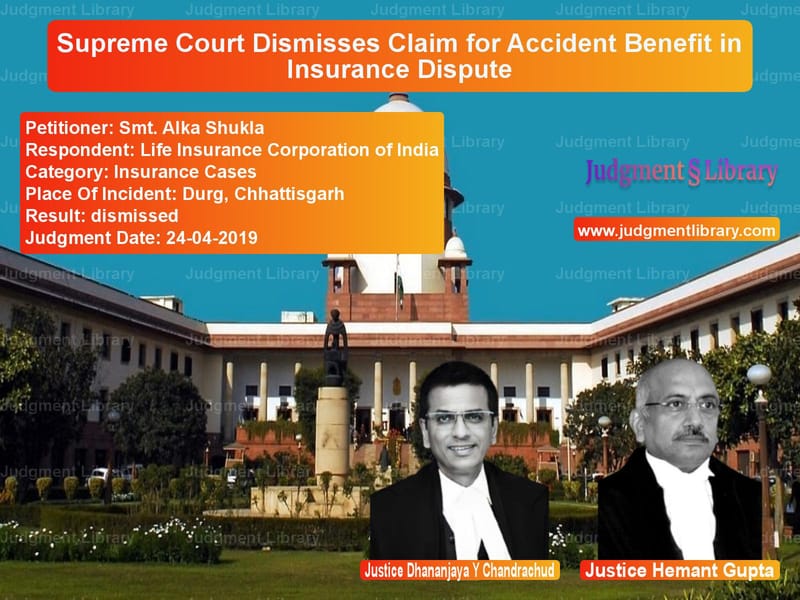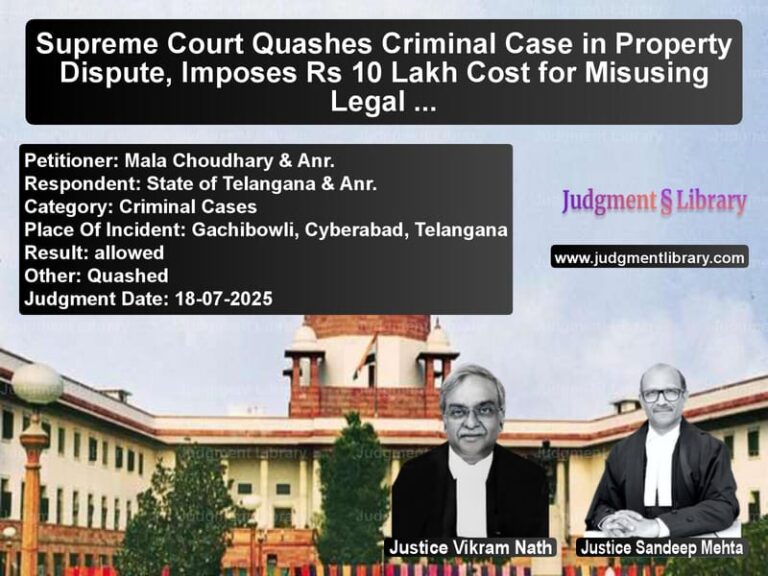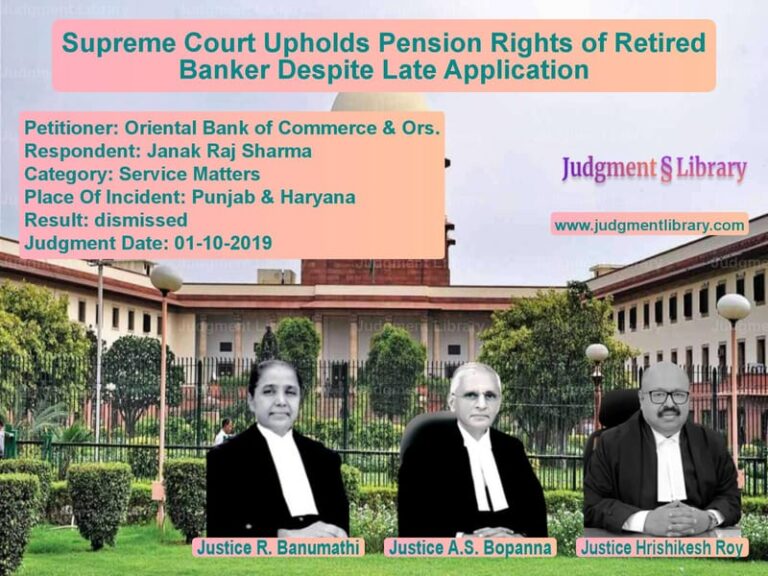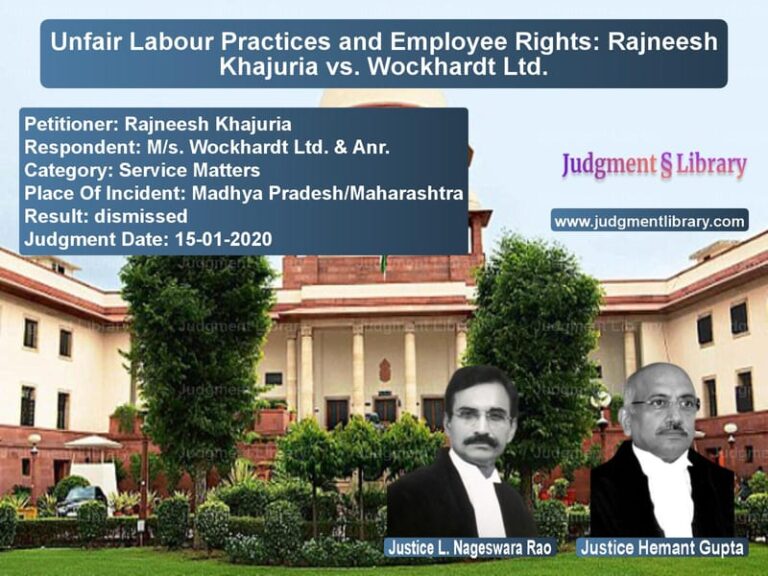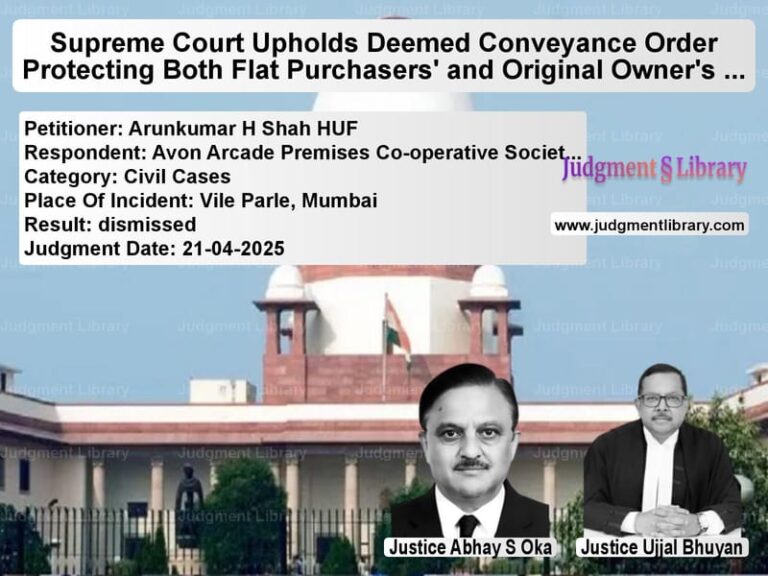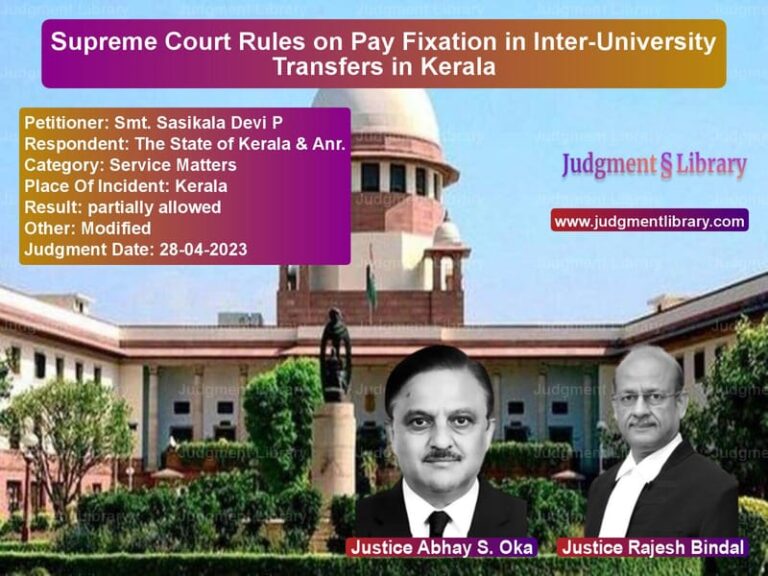Supreme Court Dismisses Claim for Accident Benefit in Insurance Dispute
The case of Smt. Alka Shukla v. Life Insurance Corporation of India revolved around the interpretation of accident benefit clauses in life insurance policies. The Supreme Court upheld the National Consumer Disputes Redressal Commission (NCDRC) decision that denied accident benefits to the appellant, ruling that a heart attack suffered while riding a motorcycle did not qualify as an accidental death.
This judgment clarifies the meaning of ‘accidental death’ under insurance policies and highlights the distinction between natural causes and external injuries caused by an accident.
Background of the Case
The appellant’s spouse had taken three insurance policies from the Life Insurance Corporation of India (LIC):
- New Bima Gold Policy
- LIC Jeevan Tarang Policy
- Twenty Years Money Back Policy with accident benefit
Each of these policies contained an accident benefit clause, which entitled the insured to additional compensation if death occurred due to bodily injury resulting solely and directly from an accident caused by outward, violent, and visible means.
On 3rd March 2012, the insured was riding his motorcycle when he suffered chest pain, experienced a heart attack, and fell off his bike. He was initially attended to by a physician and then referred to another hospital, where he was declared dead due to an acute myocardial infarction.
The appellant filed an insurance claim seeking accident benefits. While LIC settled the basic insurance claim, it denied the accident benefit, stating that the death was due to a heart attack and not an accident.
The appellant approached the District Consumer Disputes Redressal Forum, which ruled in her favor. The LIC then appealed to the Chhattisgarh State Consumer Disputes Redressal Commission, which upheld the District Forum’s decision. However, on further appeal, the NCDRC reversed the lower forums’ decisions, leading the appellant to approach the Supreme Court.
Key Legal Issues
- Whether the insured’s death was due to an accident caused by outward, violent, and visible means.
- Whether the injuries sustained due to the fall from the motorcycle were the proximate cause of death.
- Whether the accident benefit claim under the insurance policy was justifiable.
Arguments by the Appellant (Smt. Alka Shukla)
- The insured suffered a heart attack due to injuries sustained from falling off his motorcycle.
- The fall was an unforeseen accident, which triggered the heart attack.
- The insurance policy’s accident benefit clause covered such situations.
Arguments by the Respondent (Life Insurance Corporation of India)
- The insured’s death was due to a heart attack, which was a natural cause and not an accident.
- The fall was a consequence of the heart attack and not an independent accident.
- There was no evidence of external bodily injury due to outward, violent, and visible means.
Supreme Court’s Observations and Judgment
The Supreme Court examined the contractual terms of the insurance policy, medical reports, and legal interpretations of ‘accidental death.’
Key observations:
- For an accident benefit claim to succeed, the death must be caused solely and directly by an accident resulting from outward, violent, and visible means.
- The heart attack was the primary cause of death and not the fall from the motorcycle.
- The appellant failed to provide medical evidence proving that external injuries caused the heart attack.
Key Judgment Excerpt:
“There is no direct nexus or causation between the assured suffering a heart attack and injuries sustained in an accident by outward, violent, and visible means.”
The Court dismissed the appeal, stating that the death resulted from a natural cause (heart attack) rather than an accident, thereby making the accident benefit clause inapplicable.
Implications of the Judgment
- The ruling establishes that accidental death claims require clear proof of an external, violent, and visible injury as the direct cause of death.
- Insurance policyholders should carefully understand the terms of accident benefits and ensure that claims meet the policy’s criteria.
- Medical evidence plays a crucial role in proving causation in insurance claims.
Conclusion
The Supreme Court’s ruling clarifies the interpretation of accidental death under insurance policies. It reaffirms that for an accident benefit claim to be valid, there must be conclusive proof that the death resulted directly from an accident and not from a pre-existing medical condition.
Petitioner Name: Smt. Alka Shukla.Respondent Name: Life Insurance Corporation of India.Judgment By: Justice Dhananjaya Y Chandrachud, Justice Hemant Gupta.Place Of Incident: Durg, Chhattisgarh.Judgment Date: 24-04-2019.
Don’t miss out on the full details! Download the complete judgment in PDF format below and gain valuable insights instantly!
Download Judgment: Smt. Alka Shukla vs Life Insurance Corpo Supreme Court of India Judgment Dated 24-04-2019.pdf
Direct Downlaod Judgment: Direct downlaod this Judgment
See all petitions in Life Insurance Claims
See all petitions in Insurance Settlements
See all petitions in Health Insurance Disputes
See all petitions in Judgment by Dhananjaya Y Chandrachud
See all petitions in Judgment by Hemant Gupta
See all petitions in dismissed
See all petitions in supreme court of India judgments April 2019
See all petitions in 2019 judgments
See all posts in Insurance Cases Category
See all allowed petitions in Insurance Cases Category
See all Dismissed petitions in Insurance Cases Category
See all partially allowed petitions in Insurance Cases Category

